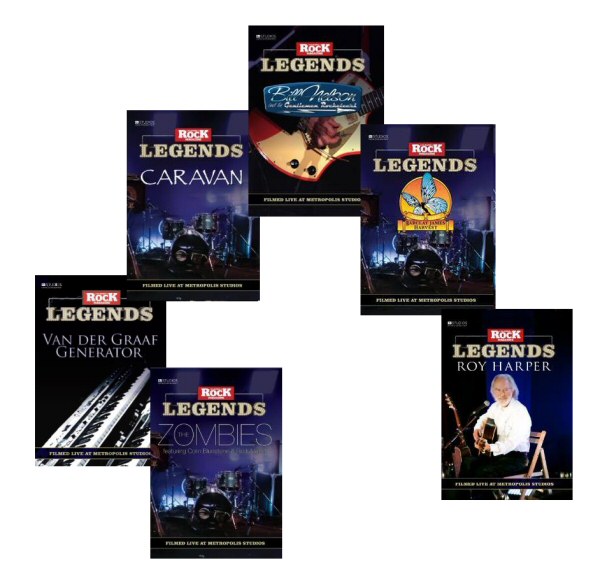
Metropolis Studios
Digger:
Hello Ian.
Ian:
Hi David, how are you?
Digger:
Great thanks.
Ian:
Thank you for the call.
Digger:
That’s alright. Shall I dive into the questions?
Ian:
Yes please.
Digger:
Please
tell us about your background.
Ian:
I started out life attempting to be a professional musician,
but putting my rent on my credit card, it didn’t last
long. (Both laugh)
Digger:
What’s your instrument?
Ian:
Drums. I got a job at Virgin, in international marketing.
With record companies you don’t have to work that hard to
stand out from the crowd, so being a bit of an early riser, I
kept getting promoted and then worked for EMI after Munns
and Levy took over at their global division. I was at their head office
at Gloucester Place back then. And then I got a job at
Universal, where I oversaw audiovisual for seven years when
DVD first took off. I started TV sales and digital sales and
for the last two and a half years I’ve been here at
Metropolis. We’ve diversified a lot since I’ve been here
and, delusions of grandeur you might say, but my ambition is
to turn this place into the new Motown.
Digger:
That would be good.
Ian:
It kind of stands to reason – we can make anything for our
clients, so if we can do that why can’t we make anything
for ourselves and create our own content? And stop worrying
about how much work people give us to keep our salaries paid
and make our own content and be masters of our own
destinies?
Digger:
Would that mean you had your own writers and session
musician working in-house as well?
Ian:
That’s the ultimate ambition. At the moment we’re
creating our own content which is basically lots of TV
formats – we have two out there already and a third one
just being signed off. We’ve got some catalogue product
that we’ve license that we have made ourselves and
commercially exploited ourselves. And lots of other things,
like stand-alone events that we use to create content, vinyl
releases and so on.
Digger:
You were looking after my mate Rod Argent not so long ago...
Ian:
That’s right. I was looking at the charts and they did
very well. They’re in the top forty DVD charts and I think
Bill Nelson’s at number ten. That’s a good example of
our new 'Motown model' where we’re getting established
artists into the studio and doing a gig with a very intimate
audience who are paying a high ticket price. This obviously
helps to generate more cash than we can make in the
recording facility alone. We are cutting out the middle-men, of
course. We are venue, we are promoter, we are record
company, we are production company and so we are making
bigger margins out of all of that. And that money goes
towards production costs and then we’re exploiting that
stuff any which way possible. It’s a very targeted and
focused marketing campaign. Because the fans are still out
there, just because there are no retail shops for them to go
and make themselves aware of these things is almost
irrelevant. If you can put it in front of their faces,
they’ll still buy it. So the campaigns are very much
online and it works. We’ve got a pretty good track record
of doing this kind of thing now and actually it’s an event
combined with a commercial release and it works very well.
Digger:
If you could only replicate that feeling of fingering through
LPs
and the rummaging and looking at artwork and sleeve notes.
Ian:
Oh, I miss that so much. There’s very few record shops
where you can go and do that now but we’re trying to
create rummaging online now so people can discover new
things.
Digger:
I sort of rummage when I go to some of the online shops and
they make suggestions about what you might like or link a
title to others of the same genre or era. That works quite
well.
Ian:
Yes, there are different ways of discovering new things
these days, I suppose. But it’s not the same.
Digger:
So you’ve given us a bit of a clue about how Metropolis
has evolved into what it is today. What sorts of things are
you working on at the moment?
Ian:
When I got here it was very much a traditional recording
studio, so they did recording, mixing, mastering and they
had a department that made DVDs. The latter was the first
one to change end evolve and it took on lots of different
freelancers and specialists – people who made TV ads, print
artwork, graphic design, programmers. So that department is
probably now 20% DVD and the rest is ads, promotional
videos, trailers, website builds, iPhone apps, Blu Rays. And
we’re now doing computer games which is a new thing for us
where we’re owning the IP. That department shoots all the
concerts in the studios…
Digger:
These computer games – are they all music-related?
Ian:
Yes. And they’re very hard to describe on the phone but
it’s quite an innovative business model, as well as a slightly
different take on gaming. We’ve started a new company
called Blink Digital and we’ve got two guys who are
ex-Activision who worked on Guitar Hero, invented DJ Hero
and I think had some involvement in Little Big Planet. And,
as with DVDs, with computer games there’s no physical
market anymore unless you’re at that very top echelon so
it’s very hard to make money out of them. So the future
that we see is streamed games to mobile handsets, iPads,
online. We’ve got three that we’re already working
on, one which launches next month called Say What? And then
we’re going to do one each quarter going forward.
Digger:
Has the music got a retro feel or is it contemporary?
Ian:
It’s both. Established artists and contemporary new
content that we’re creating with another company. We’re
also doing publishing via Metropolis Music Publishing and
one of our TV shows had a theme which was the first that
we’ve published. And we’re actively looking for new
things to publish. We have a new deal with a company called
Atlantic Screen Media that we’re doing lots of soundtracks
through. With the TV formats it’s one example of new
areas that we’re doing which uses the space and the
studios that we have to create content and to drive more
business through the studios. So it’s back to being
masters of our own destiny, to create work that generates not
only the studio fees to keep the lights on but also
long-term royalties which is really going to create growth
in the company.
Digger:
What about The British Invasion?
Ian:
Yes, we have the label, so we’ve acquired some catalogue
content – Dusty Springfield, Herman’s Hermits, Gerry
& The Pacemakers and The Small Faces. We released them
ourselves, really to prove the point that it pays to do a
really thorough job on these things. It’s not rocket
science, you understand, but very targeted and focused
marketing. Trying to involve the fans and the fan club
guys in it and we got them to come in we asked their opinions
when we were doing the mastering. That gave them a boost and
they plugged it online and spread the word as far as they
could and it’s a cost-efficient way of getting the word out
there.

The
British Invasion series features Dusty Springfield,
The Small Faces, Gerry & The Pacemakers and
Herman's Hermits with The Pretty Things and
The Hollies to come
Digger:
What was your experience there in terms of social
networking and viral marketing?
Ian:
We created our own micro site that plugged all of those
releases and they’re all obviously linked to each other.
We did lots of online networking to spread the word and we did
some direct to consumer sales which went very well, cutting
out the retailer which made us a bigger margins. That
certainly seems to be the way to go with these things. We
had hoped to do 20,000 units across those four titles in the
UK in a three year period and we did that in twelve months.
Digger:
Well done you.
Ian:
Yes, we're very pleased.
Digger:
So is it rolling out to elsewhere?
Ian:
Yes, we're doing international licence deals, which is more
of a challenge when you're a new company to get these things
off the ground but so far, touch wood, it's looking good.
Digger:
Any new titles in the pipeline for the series?
Ian:
Yes, for British Invasion we're looking at The Pretty Things
and The Hollies.
Digger:
Excellent, I just interviewed Bobby Elliott.
Ian:
Oh did you? Fantastic.
Digger:
He's a lovely fellah.
Ian:
I'm really excited to get that one out. We're just getting
the economics sorted.
Digger:
Let me know how that progresses.
Ian:
I will. And we have a new Ella Fitzgerald release which came out
just before Christmas called Best Of The BBC Vaults. It's a
CD and DVD package and all of these come out digitally as
well, of course.
Digger:
I've got the box set of The British Invasion here now and
what you seem to be doing is exploring lots of different avenues as
you are doing in your business model generally. You're not
just re-hashing old material, you're introducing new
interviews where you can with the original creators and
finding new stuff from the archives. This gives people something
new.
Ian:
The thing that always struck me is it's easy to sell a
product to fans if it's a good product. The Metropolis
name and reputation has been built over the years on sonic
quality and we're at the forefront of audio innovation and
pioneering new formats. And so once you maintain that and
put out a very well-crafted product that does the artist and
content justice and package it well...
Digger:
People aren't daft. I see reviews and people are very quick
to say if they think that it's just the same old stuff being
re-released in a new package. Whilst they appreciate that
you're dealing with back-catalogue in this instance, they
expect something new for their money too.
Ian:
You're absolutely right and you watch how quickly sales drop
off if you're releasing bad content. That's not how we want
to go on and I do want us to be a Motown for the new
millennium. It's about doing things in a slightly more
intelligent way in business deals, but also in a very
thorough way and with good quality products that we're putting
out there for people to enjoy them.
Digger: Why is retro so popular - the sixties and seventies
are as big as ever and the
youngsters are really keen on this but they didn't live through
it?
Ian: It's funny you know, because we've also noticed on the
mastering side that there's a real resurgence of cutting
vinyl - we cut loads of vinyl these days and a whole
generation of new kids are rediscovering vinyl. And, I guess,
sixties and seventies music - it's a tactile, interesting, novel
thing and leading them to rediscover an older generation's worth
of music. And it's cyclical isn't it? Everything
comes back round again. I'm 34 and my dad played Jimi Hendrix
to death and that's how I got into it and I collect more
Jimi Hendrix vinyl than you can imagine. And, saying all
that, people who are buying vinyl these days it's more of a souvenir
thing. Because where digital is such a throwaway item almost,
having something about your favourite band that you can put
on your mantelpiece is quite nice to have. I think with
most vinyl that people release these days you get a free digital
download with it to listen to on your iPod and a piece of
vinyl to look at. It ticks a couple of boxes - I'm not
really bothered if people listen to the vinyl or not, it's a
shame if they don't because the quality's amazing, but it's
nice that it's coming back round again.
Digger:
What about your personal retro passions Ian?
Ian:
Blues is my main thing, right up to Jimi Hendrix and Led Zeppelin.
The older and the more raggedy it sounds the better.
Digger:
They call stuff R&B these days and it bears no relation
to blues at all.
Ian:
Yes, it couldn't be more further removed from Rhythm and
Blues.
Digger:
I did an interview with Bill Wyman, a real champion of the
blues of course these days, and it was great fun talking to
him. The interview was only terminated when our respective
curries arrived!
Ian:
Oh really? I worked with him very briefly on a series called
American Folk Blues which was a DVD series when I was back
at Universal and he was very kind enough to do a foreword in
one of the booklets. They were fantastic.
Digger:
What are the best aspects of working at Metropolis?
Ian:
It's incredibly varied. It's very directly connected with
the artists whereas working at a record company these days you're
very far removed from that.
Digger:
Can it be confusing because you have your fingers in so many
pies and there are so many technologies and formats you're dealing
with?...
Ian: Actually, not so much because everything's
intrinsically-linked to each other so you have to look at it
slightly differently. You have an artist's content and you
need to get it out to everybody in whatever format is most convenient
for them. So you make a plethora of different ways of
consuming that content. It's quite joined-up and makes a lot
of sense if you think about it that way.
Digger: Yes, I see. So the medium almost becomes irrelevant
and you can just scatter down the content to the different
teams to get it right?
Ian:
Exactly and everything we're doing here, from creating
content, be it TV, audio, audio-visual, physical or digital
they're all connected and all the departments pitch in and
help each other out. So it's a cyclical 360 thing, I suppose
you could call it.
Digger: Is there any rivalry or competition between the
teams? As in "Our format/technology is better."
Ian: No, not at all and, whether they like it or not, they
have to work with each other because the market is so
fragmented and formats are so fragmented these days that
they couldn't just put the blinkers on and concentrate on
their one thing. Nearly every job that comes through here
has a number of different elements to it so they're always
crossing over. But, to be honest, that's one of the
interesting things for them - that they're constantly
learning and it's very varied. We don't have any jobsworths
working here - they're all working together and we want to create
that family vibe that you have with a Chess or a Motown -
that's the way we're going and everybody pitches in, gets
their hands dirty and helps each other out.
Digger: It's amazing that I can remember a world where you
had one main radio station and one TV programme a week
showing 'popular music' and they would dictate whether
something was successful or not - you had audiences in the
20 millions. Now, like you say, it's so fragmented and there
are so many ways that content is accessible and is
delivered. You don't have to worry about when or how something
is transmitted. Eventually we're just going to have one
technology, one box if you like, that delivers it all seamlessly
to the user.
Ian: If you think about it, it's going to be like it was
fifty or sixty years ago where a TV or a radio, like you
were just saying, controlled everything. When everything is completely
integrated - the phone with the TV and The Internet line,
I'm sure it will be the same again. It's just a slightly
different way of doing it. Look at how music is released
these days, because it's a singles market again exactly as
it was fifty or sixty years ago. People would release a
single on radio and then they would tour it. It's not much different
now.
Digger:
And if they were popular then the record company would give
them an album.
Ian: Exactly. I dare say someone will come up with a way of monetising
albums again in the next ten years but until then... I've
been in the music industry working in record companies and
so on for thirteen years and it's always 'been in
decline'. All I've ever heard is people moaning about
the good old days and I think "Well, actually there's
an opportunity now." With the music industry declining
- like in the housing market - in that situation, you buy
property and wait for the good days to come round again.
Here we have an opportunity with all the facilities and
resources we have at the moment at Motow... er, Metropolis
(Both laugh) A Freudian slip there... to create our own opportunities
and make it better. I'm bored with people saying gloom, doom
and despondency, we know that so work around it and make
your own chances.
Digger: One of my clients was called by a TV researcher and
asked how his business was going in the recession. He said
it was going very well because he had positioned himself so
he had a few different strands to his business and some were
actually performing better in the recession. "Oh no,
we're doing a story on how badly the recession is effecting
small businesses" said the researcher and my client had
to explain that he couldn't focus on the negatives or say it
was bad when it wasn't! When I talk to hundreds of people in
this Retro market, there is a lot of buoyancy and a really
good things going on and many of them tell me they're very
busy and expanding and all sorts of positive things.

The
Classic Rock Legend series of concerts immortalised on DVD
Ian: That's right, there's so many positives and, of course,
the recorded music market has shrunk six or eight times in
the last ten years or so, but another way of looking at it
is that music's never been so popular, it's just that the
business model has changed. So how can you make money out of
that? There's still plenty, if not more than ever, opportunities
to do so and you just have to think a little bit more
outside the box. It's not that simple and it's very, very
challenging but that doesn't mean there aren't solutions and
you have to work harder and innovate. But there are still
plenty of people out there making money.
Digger: What's exciting you about the future possibilities for
Metropolis Ian?
Ian: We've partnered up with a music college called Brighton
Institute of Music and we started an A&R course which is
a nice evolution to the service side of the business where
we're giving something back to kids who want to learn about
being A&R men or producers or in production. The top
three kids there get a job at EMI as scouts.
Digger: Looks good on their CV.
Ian: Yes it does. Also, we planted the seed early that Metropolis is
at the forefront of all production so that when they go to
work at the client side they come back here nice and regularly,
or I'd like to hope so anyway. We started building a studio
in Qatar in the Middle East which will be called Metropolis
Middle East and that is very exciting. We'll be doing a lot
of orchestral scores and it has an on-site philharmonic orchestra
which gives us the opportunity to do very competitive
orchestral work and that will open October/November 2011.
And then the TV format stuff - we've got one called On Track
which just won an award with Music Week last week for best
music and brand. We're joint venture partners with Universal
on that one and we had a series of twelve releases go up
just before Christmas on Channel 4 that did very well
ratings-wise and has been commissioned for a second series
in August this year. Bigger artists and more international,
so that's exciting. We've got a Classic Legends series which
you mentioned earlier, the Bill Nelson, and we're looking at
series two of that toward the end of this year.
Digger: Can you say who's going to be on those?
Ian: We don't yet know - we're looking at loads of different
artists at the moment and just looking at clearances to find
out what's what. The feedback we got from the first one was
that the fans loved it and the reviews were amazing so it
ticked all the boxes from that point of view and form a
commercial point of view, so far, it all looks as though
it's moving in the right direction. So we'd like to do one
of those a month. And on the label side The Hollies and The
Pretty Things on the British Invasion, a few more Vintage
Vaults releases and we've got a couple of big, high-end,
fan-focused box-sets coming.
Digger: Like what?
Ian: One is a nineties Britrock artist - I can't mention the
name because, again, we're waiting for clearance but that is personally
very exciting for me. And we've got these very cool events
with The Guardian going, which is The Record Producers Live.
That is Steve Levene's Radio 2 show, where he replicates
live what's going on, and we talk with and listen to live,
some really great sixties and seventies rock artists who
come down. They're ticketed events and we then create
content out of it with our partners Universal where they add
bonus features on CDs, DVDs and iTunes LPs etc. Lots of
exciting events-based things coming up.
Digger: Isn't it such a shame that so much sixties and seventies
video was wiped by the TV companies?
Ian: Can you believe it? it's criminal, isn't it?
Digger: But it made sense economically at the time.
Ian: Sure. So many wonderful things lost.
Digger: I just hope that somehow, like Spielberg thought we
might theoretically manage to recreate the dinosaurs via
DNA, we might be able to recreate these programmes at some
time in the future by picking up the original transmissions
on the airwaves!
Ian: That's right.
Digger: I don't know how. But if they can get colour TV back
from black and white copies of the original colour
recordings.
Ian: Yes, we do a lot of that downstairs in the digital video
department.
Digger: I'll have to come and have a visit.
Ian: Yes, come along for a cup of tea. Early mornings are
best before the artists get in and I can show you round.
Digger: Sounds good. Thanks Ian, it's been great.
Ian:
Well thanks very much for your call, I appreciate that.
Digger:
It's been very informational and inspirational. It sounds
like you've got a wonderful job there.
Ian:
It's not without its challenges but very exciting. Thanks
very much David.
Digger:
Thanks Ian, take care.

Ella
- just one of the nuggets from the BBC Vaults

Metropolis
Group Ltd houses the most successful independent recording,
mastering and production facility in Europe, offering
unrivalled services for the Music, Film & TV industries.
As well as
this, Metropolis are a record label (releasing the British
Invasion DVD Box Set (including Small Faces, Dusty
Springfield, Herman’s Hermits, Gerry & The Pacemakers)
and Ella Fitzgerald ‘Best Of The BBC Vaults’ DVD/CD), a
music publishing company, produce TV shows (Channel 4’s
“On Track with SEAT” and ITV Legends), and they host
industry events and showcases.
Some of the
most classic albums of all time have been recorded and mixed
at Metropolis including The Verve’s “Urban Hymns”, The
Stone Roses’ “The Second Coming”, Queen’s “Made In
Heaven” and “Innuendo”, The Libertines’ “The
Libertines”, and Amy Winehouse’s “Back To Black”.
Metropolis
Group Ltd
The Power House
70 Chiswick High Road
London W4 1SY
Tel: 0208 742
1111
Email: hello@metropolis-group.co.uk
www: Metropolis
Group